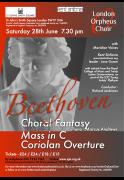The London Orpheus Choir will be joined by Meridian Voices and Kent Sinfonia for an all Beethoven concert in the glorious surroundings of St John's Smith Square. Our pianist will be the wonderful Marcus Andrews and, as part of the LOC Young Artists’ Platform, our soloists will be students from the Royal College of Music and the Trinity Laban Conservatoire.
Choral Fantasy, Op.80
Uncharacteristically for Beethoven, this work is exuberant and happy. The work begins with a lengthy solo piano passage that Beethoven himself improvised at the premiere. The orchestra then joins in, creating a concerto-like effect. The chorus enters for the grand, exuberant finale.
There is much resemblance between this work and Beethoven’s Symphony No. 9, the Choral. Indeed, there are similarities between the principal melodies and the philosophies expounded by the two texts. The symphony praises the brotherhood and goodwill that arise from shared joy. Similarly, the text of the Choral Fantasy proclaims in its concluding measures, “When love and power unite, God’s grace descends on all mankind.”
Mass in C, Op. 86
Beethoven composed his Mass in C, opus 86, in 1807 during a highly productive and mature compositional phase. This included three "Razumovsky" string quartets, the piano sonata "Appassionata," the Fourth Symphony, Fourth Piano Concerto, and the Violin Concerto. Nevertheless, it was his first foray into the mass and he approached the composition with some trepidation. He need not have worried because the C Major Mass is glorious. And, if you know his later Missa Solemnis – you will hear many similarities and echoes. Beethoven is famous for being very hard on his singers and this work is no exception.
Coriolan Overture, Op 62
Like Beethoven's overtures to Egmont, Leonore and The Ruins of Athens, the Coriolan Overture was originally written for the theatre. Coriolanus's frustrated rage, and the conflicts he confronts, are fully explored in the overture, and give rise to some of the most explosive and violent music Beethoven ever wrote.
Beethoven Choral Fantasy and Mass in C
St John's Smith Square, Westminster, London

Ad
Event has ended
This event ended on Saturday 28th of June 2014
This event ended on Saturday 28th of June 2014
Admission
£24/£22/£18/£15 in advance from the St John's Box Office or on the door
£24/£22/£18/£15 in advance from the St John's Box Office or on the door
Location
St John's Smith Square, Westminster, London
Tags:
Music
User Reviews
There are no user reviews
